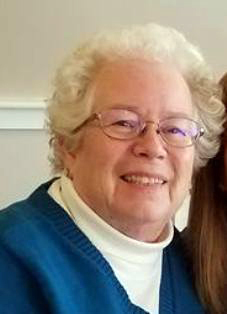
Backyard beekeeper and master gardener Jean Vose. (Photo courtesy Jean Vose)
Nobleboro beekeeper, master gardener, and certified horticulturist Jean Vose will share her extensive knowledge of honeybees and other pollinators – and the gardens one can plant to attract them – during two talks she will give at Ladies Day on Saturday, April 22 at Damariscotta Hardware.
It is no secret that honeybees have been struggling for some time now, due in part to a decreasing amount of habitat conducive to their survival. Thus, talks like the ones Vose will give are becoming increasingly important in the effort to save the honeybee from further decline.
“Honeybees, along with many other insects – pollinator and nonpollinator alike – are in a declining state of health and, therefore, populations are decreasing as a result,” Vose said. The main reasons for global bee decline are industrial agriculture, parasites, and pathogens, and climate change, she said.
“The loss of biodiversity, destruction of habitat, and lack of forage due to monocultures and bee-killing pesticides are particular threats for honeybees and wild pollinators,” Vose said. “”Pollinator declines are important in themselves, but more significantly are a symptom of outmoded agricultural practices such as monoculture plantings. For example, over the years, agricultural fields and orchards have done away with hedgerow plantings of native plants and flowers that provided a variety of pollen and nectar sources for pollinators.”
Vose firmly believes that “every effort helps all our pollinators. None of us can expect to fully support the nutritional needs for the pollinators in our yards, but providing plant and habitat materials will certainly help them.”
A friendly “bug environment,” Vose said, “includes native plants, a water source, leaving some areas untidy, having plants that bloom throughout the season, and selecting sunny locations for your flower garden protected from the wind.” She advocates providing “water, nectar, shape, and color attractive to bees, moths, toads, butterflies, beetles, and birds.”
Creating a pollinator-friendly garden “is no different than creating any other garden. You need a piece of land and a list of plants that attract the pollinators,” said Vose. “For me, the joy comes when I walk into my gardens to hear the buzz of insects as they are busy collecting nectar and pollen, when I watch the bees in the bee bath getting a drink, when I see the butterflies sipping nectar from the flowers.”
Besides, the alternative – a world without pollinators – seems grim, as pollinators are vital to the growth of the food people eat.
“One out of every three bites of the food Americans eat is the direct result of pollination by insects – for example, apples, blueberries, cranberries, cucumbers, and green beans,” said Vose. Pollination is also “vital for the foraging crops, such as field beans and clover, used to feed the livestock we depend on for meat.”
Ladies Day will be held from 10 a.m. to 4 p.m. April 22 at Damariscotta Hardware, 423 Main St., Damariscotta. Vose will hold two presentations at the event. “How to Create a Pollinator-Friendly Yard” will take place at 11 a.m. and “How to Make Items to Attract Pollinators to the Yard” will take place at 3 p.m. She will also have a table featuring many handouts as well as pollinator plant lists.
Knox-Lincoln County Beekeepers will host a honey-tasting table throughout the day, featuring six types of honey; beekeepers will be on hand at the table to answer beekeeping questions.






